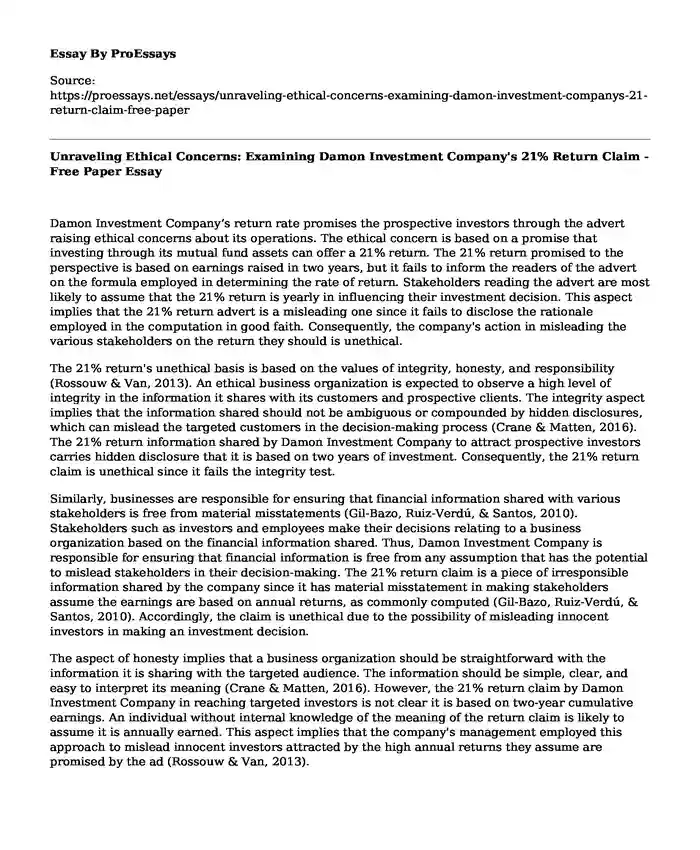Damon Investment Company’s return rate promises the prospective investors through the advert raising ethical concerns about its operations. The ethical concern is based on a promise that investing through its mutual fund assets can offer a 21% return. The 21% return promised to the perspective is based on earnings raised in two years, but it fails to inform the readers of the advert on the formula employed in determining the rate of return. Stakeholders reading the advert are most likely to assume that the 21% return is yearly in influencing their investment decision. This aspect implies that the 21% return advert is a misleading one since it fails to disclose the rationale employed in the computation in good faith. Consequently, the company's action in misleading the various stakeholders on the return they should is unethical.
The 21% return's unethical basis is based on the values of integrity, honesty, and responsibility (Rossouw & Van, 2013). An ethical business organization is expected to observe a high level of integrity in the information it shares with its customers and prospective clients. The integrity aspect implies that the information shared should not be ambiguous or compounded by hidden disclosures, which can mislead the targeted customers in the decision-making process (Crane & Matten, 2016). The 21% return information shared by Damon Investment Company to attract prospective investors carries hidden disclosure that it is based on two years of investment. Consequently, the 21% return claim is unethical since it fails the integrity test.
Similarly, businesses are responsible for ensuring that financial information shared with various stakeholders is free from material misstatements (Gil-Bazo, Ruiz-Verdú, & Santos, 2010). Stakeholders such as investors and employees make their decisions relating to a business organization based on the financial information shared. Thus, Damon Investment Company is responsible for ensuring that financial information is free from any assumption that has the potential to mislead stakeholders in their decision-making. The 21% return claim is a piece of irresponsible information shared by the company since it has material misstatement in making stakeholders assume the earnings are based on annual returns, as commonly computed (Gil-Bazo, Ruiz-Verdú, & Santos, 2010). Accordingly, the claim is unethical due to the possibility of misleading innocent investors in making an investment decision.
The aspect of honesty implies that a business organization should be straightforward with the information it is sharing with the targeted audience. The information should be simple, clear, and easy to interpret its meaning (Crane & Matten, 2016). However, the 21% return claim by Damon Investment Company in reaching targeted investors is not clear it is based on two-year cumulative earnings. An individual without internal knowledge of the meaning of the return claim is likely to assume it is annually earned. This aspect implies that the company's management employed this approach to mislead innocent investors attracted by the high annual returns they assume are promised by the ad (Rossouw & Van, 2013).
Conclusion
Consequently, Damon Investment Company is unethical in making the 21% return claim dishonestly to the targeted prospective investors. It is recommended that the company employ a conservative, effective annual rate in reaching prospective investors. The approach is ethical since it makes the information clear to prospective investors on the return they should expect annually.
References
Crane, A., & Matten, D. (2016). Business ethics: Managing corporate citizenship and sustainability in the age of globalization. Oxford: Oxford University Press.
Gil-Bazo, J., Ruiz-Verdú, P., & Santos, A. (2010). The performance of socially responsible mutual funds: The role of fees and management companies. Journal of Business Ethics, 243-263.
Rossouw, D., & Van, V. (2013). Business ethics. Oxford: Oxford University Press.
Cite this page
Unraveling Ethical Concerns: Examining Damon Investment Company's 21% Return Claim - Free Paper. (2023, Dec 13). Retrieved from https://proessays.net/essays/unraveling-ethical-concerns-examining-damon-investment-companys-21-return-claim-free-paper
If you are the original author of this essay and no longer wish to have it published on the ProEssays website, please click below to request its removal:
- The Compulsion Towards Conformity - Essay Example
- Report on Mandarin Oriental Company and Workations Trend
- Short and Long-term Goals in Entrepreneurship Essay
- Microsoft: Competing on Talent Essay Example
- Essay Sample on Political Theory and Budget
- Sexual Harassment: A Rampant Problem in Leisure and Hospitality - Research Paper
- Essay Example on Foodservice Management: Job Opportunities in Higher Ed







